The Werewolf of Mariahilf am Inn I.7
A Gothic Horror Novel
Book 1, Chapter 7: The Visitation
List of Chapters | Previous Chapter
Hermann stood at the mirror in the private lavatory of the guest house in Cologne, located in a row of plaster-fronted buildings behind the church of Sankt Maria im Kapitol (Saint Mary’s in the Capitol). He was clipping his mustaches before bed. It was the last days of March, 1867, and he had broken the evening’s fast in the taproom downstairs with a plate of grilled potatoes and onions.
Oma Ingrid had told him when he was a child that he had been named after Hermann II, the Archbishop of Cologne, who had expanded Saint Mary’s to its current form sometime in the middle ages. In the daylight, the squat Romanesque church could be seen from the lavatory window. But the Kapitol-Viertel was unilluminated tonight, and a brown mist had rolled in from the Rhine.
He had been away from his family for less than two weeks. But it felt like months. He arrived too late in Cologne on Friday to continue to Cronenberg. So he rented this room and went to the telegraphy office Saturday morning to send a message before the businesses closed for the Sabbath. He paid extra to ensure the courier in Cronenberg delivered it by sunset. In it he stated there were no coaches available and that it would be inappropriate to travel on the Lord’s Day. So he had booked a seat on Monday morning’s mail coach to the Wupperthal and would be back by noon.
He carried the candle from the lavatory to the bedroom. There was a knock at the door. When he answered, the proprietor stood in his nightshirt behind Berthold.
“Thank God we’ve found you. Your telegram said you were near Saint Mary’s. Please pack. We must return to Cronenberg tonight.”
“What’s happened?”
“Henrietta and the children are safe. But I can’t explain. It’s too terrible. I can only show you. Hurry.”
Hermann put on the traveling clothes he’d worn for the last four days and packed his suitcase as Berthold settled the bill with the proprietor. Outside there were two horse-drawn coaches. One was occupied by Berthold’s foreman, Maximillian. It was the spare in case the other broke down. Berthold had hired four furloughed soldiers to provide security, since the roads in and out of Cologne were not patrolled at night. One of the soldiers carried a lantern and rode ahead to scout the way.
Despite Hermann’s questions, Berthold would not speak during the journey. He urged Hermann to sleep if he could. They made it to Cronenberg shortly after dawn and pulled into the mansion’s long drive.
Ursula opened the door. “Berthold, what is the meaning of this? The servants have not let us leave the house since yesterday.”
“Go back inside!”
“Not until you explain—”
“Ursula, I will not be gainsaid on this matter!”
“Hermann!” Henrietta exclaimed from the door, as Frank pushed past her and ran out.
“Papa!”
“Go back inside, Frank!” Hermann yelled.
“No,” Berthold said. “The boy is old enough. He should see.”
Berthold directed Maximillian to pay the coachmen and soldiers. He turned to Hermann and Frank. “Come with me. We’re going into the valley.”
When he said this, Hermann knew this had something to do with his father’s grave. They passed through the wrought iron gate built into the wall of the gabled cloister linking the older part of the estate with the newer addition (Tischler House) where Hermann and his family lived.
Behind the mansion were the wooden steps descending into the valley where the factory lay. At the base of the steps, the groundskeeper Karl was waiting in a felt coat and cap. Karl lived alone in a shack at the edge of the grove where Hermann’s father had been interred. Since it was Sunday, the factory and outbuildings stood vacant.
Berthold began to talk. “Yesterday morning before your telegram arrived Karl alerted me to an unspeakable act of vandalism and desecration.”
They entered the clearing. On the ground not far from Moritz’s headstone was a staked-down tarp covering something. The vernal breeze rippled the canvas. Hermann looked at his son, whose face had gone white.
Berthold removed his gloves. “Someone has dug up your father’s body and contorted the skeleton to make it look as if he crawled from the ground.”
“It’s disgusting,” Karl remarked.
The industrialist wiped his brow. “There is not a God-fearing soul in Cronenberg capable of an act so repugnant and savage.”
In a daze Hermann looked at the banked-up dirt around the hole. “Could it have been a dog or . . .?”
“No,” Karl interjected. “There were no tracks. None. It’s damned peculiar.”
“Did you hear or see anything?” Hermann asked the groundskeeper.
Karl shook his head and stroked his beard. “I was asleep. It’s still cold out, so I keep the windows shut at night.”
“Frank!” Berthold yelled. “Don’t!”
But it was too late. The boy had bent down and pulled up one of the stakes. A sudden gust of wind snapped the cloth away, ruffling the white hair that ran from the skull to the base of the spine. Patches of hair covered the desiccated shoulders and buttocks. Curling black fingernails dug into the dirt.
Hermann slapped his son twice. “Go back into the house!”
The boy fled, crying.
“Where’s the suit he was buried in?!” Hermann hissed.
“Gone,” Berthold replied.
“Cover my father’s nakedness!”
Karl bent down to re-secure the flap.
Berthold addressed Hermann in a clinical fashion. “The coffin was torn open. I have paid Karl well to restore Moritz’s remains to their rightful place. On Tuesday I shall have Maximillian and his crew fill the shaft with gravel and concrete.”
Karl rose from the tarp. “I’ll guard your father’s grave, Herr Tischler. I have a rifle in my cabin, and if anyone disturbs the plot again, I’ll not hesitate to use it.”
Berthold shook his head in utter disbelief. “I have never seen . . .” He could not finish the sentence.
Hermann recalled his father’s words in that dream he’d had—words the werewolf of Mariahilf am Inn repeated through the aged lips of the beggar woman on the steps of the Frauenkirche in Munich: “I’m so sorry, son.”
They left the grove. Hermann saw at the top of the steps that Maximillian was comforting Frank.
That night Hermann’s reunion with his family was tense and frigid. He passed around the gifts from Bavaria. Henrietta commented animatedly on the craftsmanship of the decorated Easter eggs. Ursula tried her best to raise the children’s spirits, suggesting they might travel to Bayreuth in the summer to attend the opera, and then spend a month in Berlin to visit Berthold’s nephew Ludwig, now a Colonel in the Prussian military.
Neither Hermann nor Berthold responded.
Frank went to Hermann to thank him for the whittling knife. He turned to walk away. But Hermann seized his son’s wrist and drew him in, whispering into his ear: “I’m so sorry, son.”—Then he gasped and turned away, pressing his palms to his temples.
Frank turned to his mother in confusion. Henrietta handed Erika to Hermann, who stroked the silk bow on the baby’s head. He looked at his wife helplessly.
“I’m not feeling well, my love. I might wake you or the baby if I sleep in our room tonight. I shall stay here.”
“Here?” she asked. “Where will you sleep?”
“In my father’s old room.”
Ursula and Henrietta exchanged significant glances.
Charlotte was reading the newspaper to Berthold, who overheard what Hermann said. The old man addressed the room. “The ride from Cologne to Cronenberg was wretched. Hermann has not had a good night’s sleep. I too am spent.” He smiled at his granddaughter. “My dear, let us resume Monsieur Thiers’s parliamentary speech tomorrow when our minds are refreshed.”
“Yes, Opa,” Charlotte said dutifully, folding the newspaper.
Ursula cleared her throat and rose from the settee to accompany Henrietta and the children to Tischler House.
When Berthold and Hermann were alone, the industrialist spoke. “I do not believe in the supernatural, but the shock of today’s revelation could awaken dark and fantastic visions. I would urge you to return to your wife, my daughter. Besides, your father’s room has not been aired since his death. The must, mold and decay might have bred insalubrious—even noxious—vapors.”
“I’ll be fine,” Hermann said, rising from the couch and taking a candle from the mantel.
“Ludwig’s old room is available.”
“I’ll be fine,” Hermann repeated, testily.
Hermann’s father, Moritz, had been of a spartan disposition and temperament. He had insisted on sleeping in a threadbare room over the mansion’s pantries and indoor pump. It could only be accessed from the kitchen or back door near the rubbish bins.
Hermann traversed the dining room and stepped into the kitchen, where Imogene, the eldest of the three Alsatian maids, sat at the cutting board table, smoking a cheroot in the guttering candlelight.
Imogene had been born and raised a Catholic, but no longer attended Mass or prayed, although she swore a great deal. Without sharing her private views, she had cultivated a host of mannerisms, ranging from aloof disdain to bemused disinterest, with respect to matters spiritual and divine. So when Hermann walked in on her smoking, she mumbled an apology and casually moved to stub out the cheroot, knowing full well that he would tell her not to do so, since she was not the one fasting.
“Please don’t,” Hermann said. “I’m so sorry to disturb you, Imogene. But I was wondering if you knew where the key to my father’s room is.”
“Oui.” She stood up and opened a wall-box near the larder, removing an iron key. “The only one, Monsieur.”
“Thank you.”
He walked from the kitchen to the tiled room where the water pump and galvanized tub stood between the curtained pantries. Opposite the back door was a narrow staircase leading up to the second floor. By the candlelight Hermann climbed the steps. When he reached the top, he found the passageway littered with cracked timbers, torn drapes and broken furniture.
Within a few months of their arrival in Cronenberg, Berthold had moved Moritz and Hermann into the mansion, granting them exclusive use of this space, which had been the servants’ quarters when the original timber-framed structure was built in the mid-17th century by an eccentric Swedish diplomat, who (fearing German treachery), had refused to sleep in the walled city of Münster during the drafting of the Westphalian treaties that ended the Thirty Years’ War.
Hermann went to the door of his father’s room. He drew in a deep breath and inserted the key. But before unlocking it, he placed his ear against the unvarnished wood and listened. The only sound he heard was the creak of the rotting floorboards.
He gritted his teeth. To hell with this, he thought.
He removed the key and walked swiftly back down the steps. Imogene was no longer in the kitchen. A thin wisp of smoke rose from the wick of the candle on the cutting board. Hermann blew out his own candle and put it on the table beside it. Then he laid the key between them so that she would see it in the morning.
He returned to the tiled room and exited the mansion through the back door, passing the rubbish bins before making his way into the cloister. The gaslight from the mansion diffused its sickly beams through the damp gloom of the quadrangle.
Ursula emerged from Tischler House and the two met midway beneath the groined arches. Her voice was brittle when she addressed him. “I see you’ve come to your senses. Berthold will not tell me what happened in the valley. But you have been acting erratically for months now, Hermann. It is unbecoming. You will treat my daughter with respect. You are my son-in-law and I love you. But my grandchildren come first, and if their father is on the verge of a nervous collapse, I shall do everything in my power to safeguard their interests and preserve their welfare.”
Hermann lowered his eyes. “I hope to regain your trust.”
“Oh Hermann, you never lost it. But it has been shaken.” She drew up the skirts of her gown and walked past him. “It will rain tonight. Make sure the windows near the crib are secured. A draft could kill the baby.”
He entered the house and climbed the steps. On the landing, Charlotte peered at him from behind her bedroom door. But when she realized he had seen her, she receded into the shadows.
He entered the bedroom and turned the knob to lower the gaslight. Henrietta was blowing out the candles that had been lit earlier for added illumination. Without looking at her, Hermann checked the windows as Ursula had bade him do. They were shut and latched. He stood over the crib, smiling down on the sleeping baby. When he raised his eyes, Henrietta sat on the chaise lounge in a state of dishabille, scrutinizing him narrowly.
“Why did you go to Munich?”
“For private reasons.”
She frowned and looked at the coffered ceiling.
Hermann knew what she was thinking. She was forbidden by law and custom to ask a question that might insinuate a moral failing on his part. He went to her and drew her up.
“I swear to God, Henrietta, there was no dishonor in my trip. I went seeking information about my mother’s past.”
It was not a lie, but it lacked candor.
“You never speak of her.”
“I never knew her.”
“I wish you would tell me what is troubling you so that I could help. If it’s a matter of returning to the Tyrol, the children and I will come with you. We will stay with my uncle in Innsbruck.”
“I’m not from Innsbruck.”
“I know. You’re from a place called Mariahilf.”
He stared at her in mute surprise.
“You’ve mentioned it in your sleep.”
He disrobed and put on his nightshirt. Then he doused the gaslight.
She took his hand and guided him to their bed. They lay in each other’s arms as the March showers drummed a soothing tattoo against the thick panes. Had they not been under the bans of Lent, they would have made love. Exhausted, Hermann fell asleep.
And that’s when the nightmare began.
In his dream he slept in the room his father had died in. But he had awakened because the sheets were sodden with rain. Hanging on the wall at the foot of the bed was the wood-panel painting of Our Lady of Mercy that Moritz had made for the headboard of Hermann’s bed when he was a boy.
And the subconscious associations between the bed, the lacquered panel and the headboard made him wish he had a wooden paddle with which to spank Henrietta until she pissed the bed under the calm gaze of the Holy Mother.
Hermann yawned and scratched his swollen teats as he climbed from the bed and walked out the door, which led to the top of the steps overlooking the valley. He gazed down and saw by the glowing blast furnace a hairy giant with a canine head. The figure swayed over the factory’s chimneys, waving at Hermann, who waved back.
He was embarrassed, because Imogene the maid was on her knees beside him, sucking Oma Ingrid’s veiny tail. Then his attention was drawn to the second-story window of Tischler House, where he knew he slept in Henrietta’s arms.
He stood over his bed, looking down at Henrietta and at his sleeping self. It disgusted him, so he made stabbing motions with his fist, because he realized he was Hermann II, Archbishop of Cologne, and was dreaming. This made him sit up in bed (yet again), as Henrietta touched him. But it wasn’t Henrietta beside him; it was his witch mother, Ilse.
Then top-hatted Moritz stood over Erika’s crib. “I’m so sorry, son,” he said, as Ilse sat bolt upright in bed and screamed. But her scream made no sound. And the cannibal of Mariahilf am Inn stood naked in the center of the room, laughing and stomping his hooves, as he bent at the waist and farted a black mist that spattered the crib’s canopy in blood and rain.
—Glass shattered.
Hermann leapt from the bed. Henrietta sat bolt upright and screamed. Without a second thought, Hermann ran over broken glass to the crib. Erika was crying. He lifted her up, insensible of his lacerated feet, and dashed to the door.
“Take the baby!” he yelled.
Henrietta grabbed Erika and fled. Hermann slammed the door and turned to confront the presence moving in the dark. Amid the wind and lashing rain he heard four hooves stomping on the carpet. The beast leapt onto the bed, which cracked and split under its weight.
On the landing he heard the children shrieking as Henrietta commanded them to run.
Hermann could make no sense of the pale glistening shape writhing on the bed. For many minutes he stood in a state of horrified stupefaction, hands raised before his face. The creature snuffled the covers and growled. Then it spoke in the voice of the cannibal of Mariahilf am Inn.
“Little boy, little boy. I shall chase you to the farthest reaches of the Earth. From the depths of Hell, I shall howl at you. And I shall eat your children—even as I ate my own, whom you slew.”
The door flew open and Berthold entered in his robe, holding a lantern.
“Do you have a pistol?!” Hermann screamed.
“No!”
“There’s something on the bed!”
They heard a gurgle, followed by a heavy sigh. With no weapon at hand, Hermann seized the stool by the door and held it bracingly before him, like a lion tamer.
They approached the bed, tremblingly, as the lantern’s beams swept the covers, disclosing a dead man sprawled naked on the rain-drenched sheets, drool and foam oozing from his still-quivering lips.
“My God!” Berthold shouted and turned away in revulsion.
Gazing up at them with bulging eyes was the gory, smiling corpse of the groundskeeper, Karl.


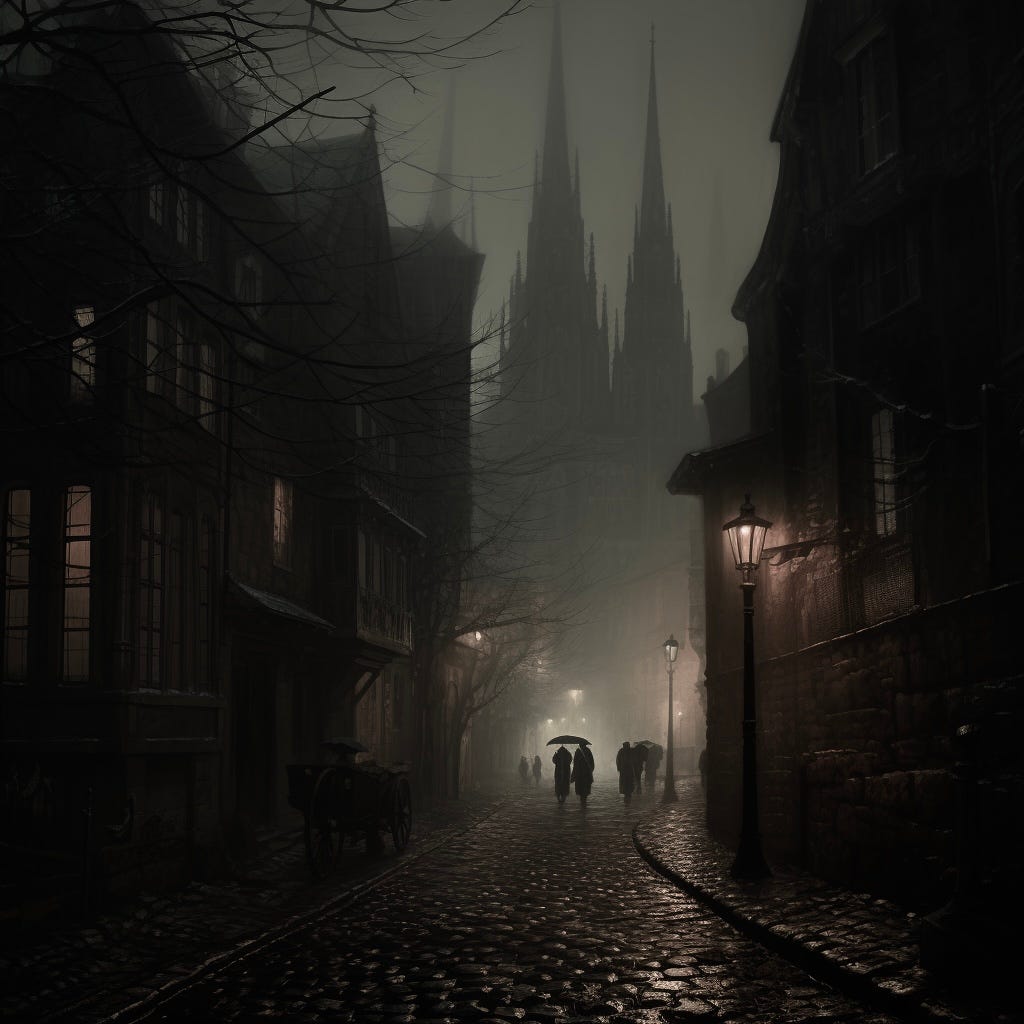



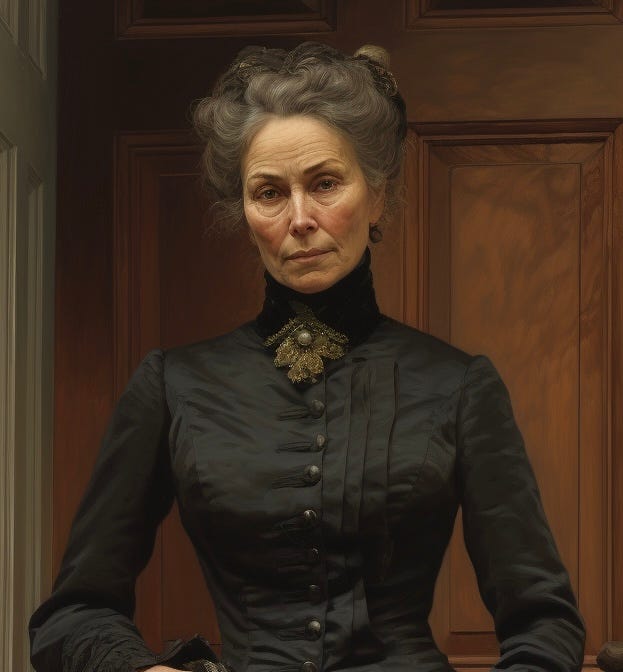

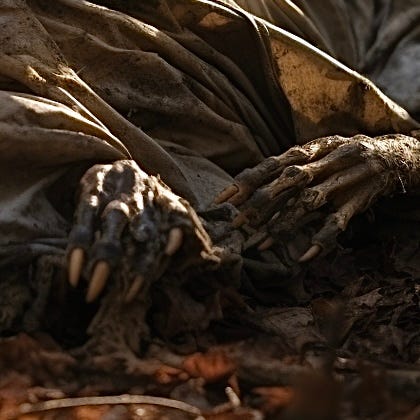


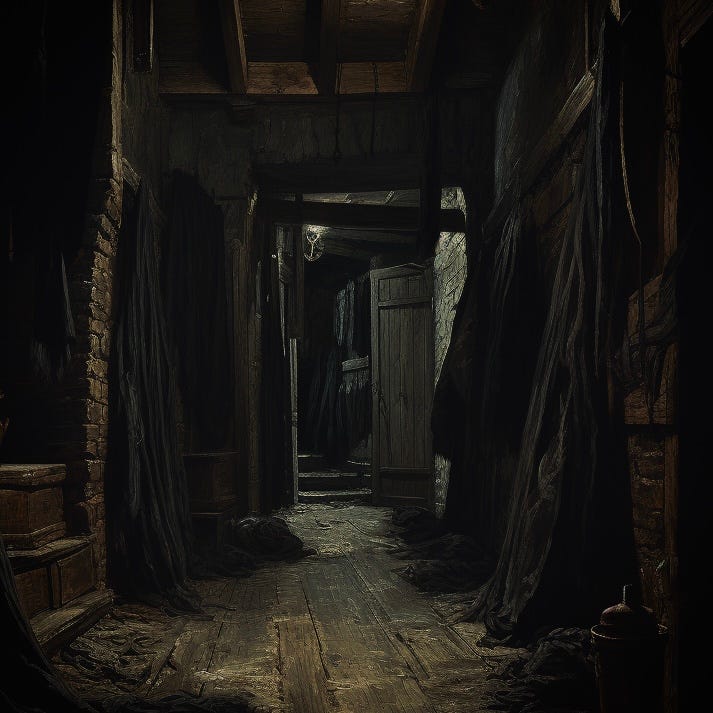
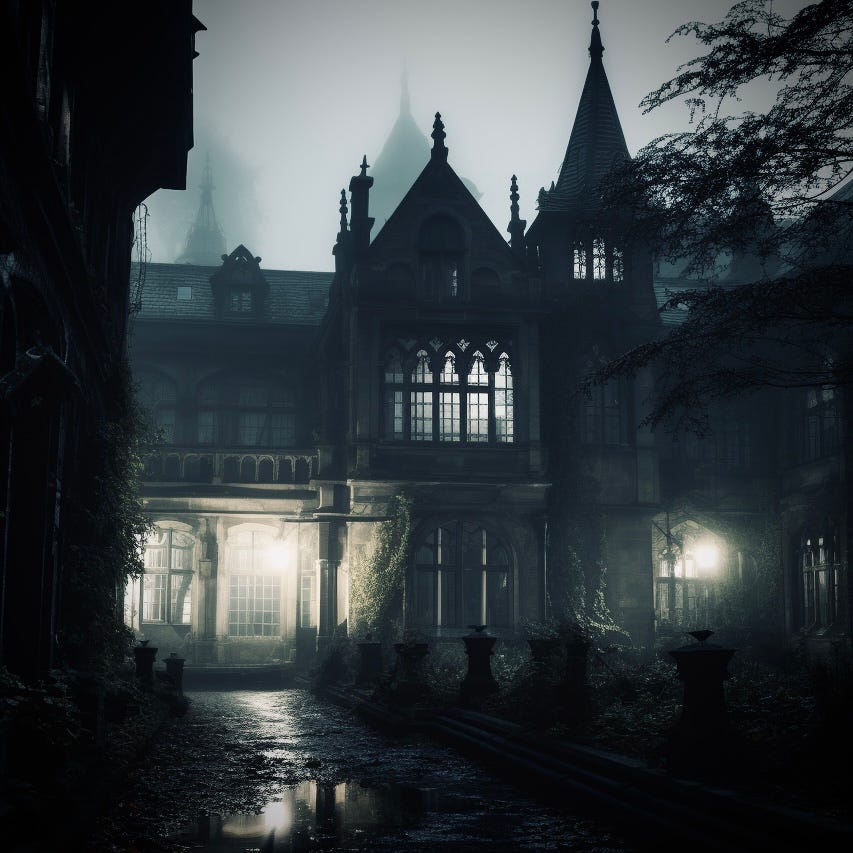

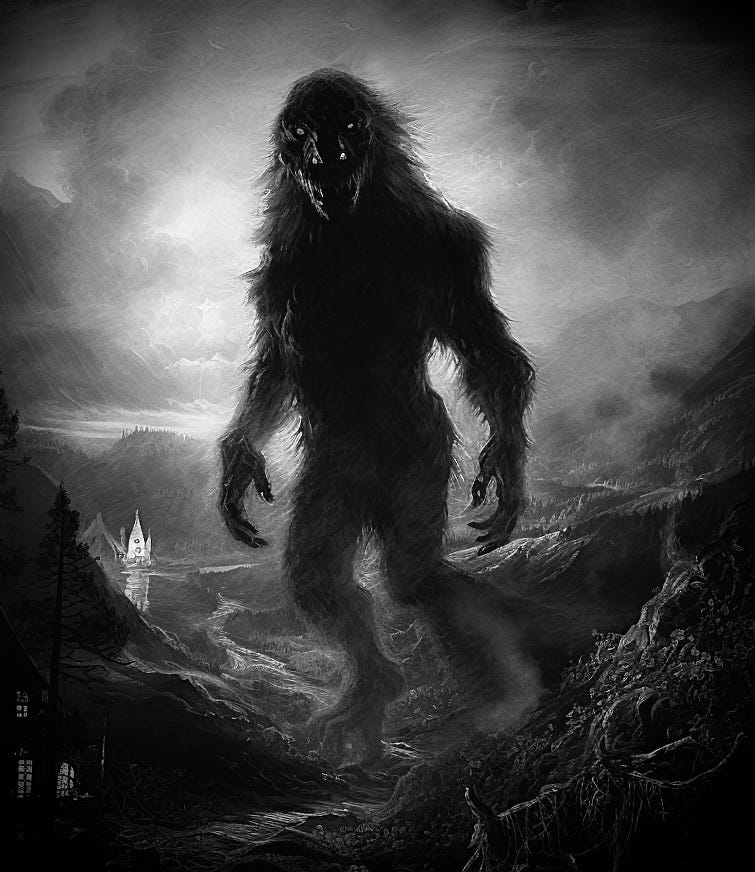
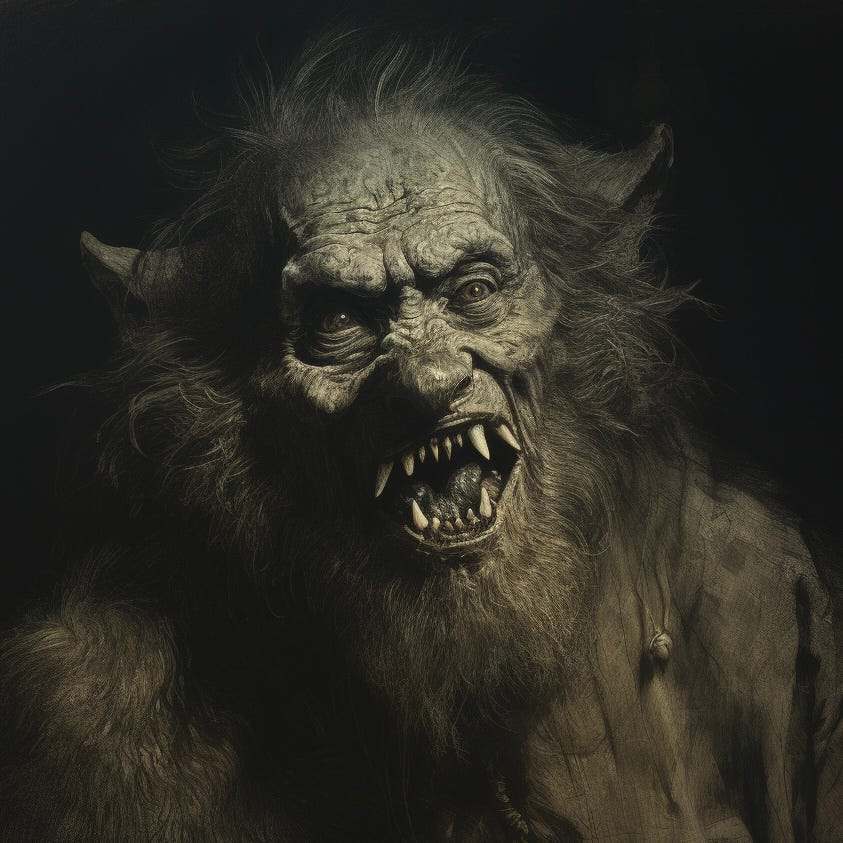
This is one of the best things on Substack right now.
This was so intense; the emotions, the atmosphere, the dialogue. I couldn’t stop reading!